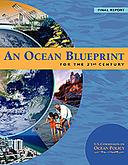An excellent overview about the national imperative to form COSEE was included in a 2007 article published in Current: The Journal of Marine Education (Vol. 23, No. 1). Below is an excerpt from this article.
COSEE IN A NATIONAL CONTEXT: A FEDERAL PERSPECTIVE
By Paula Keener-Chavis, Elizabeth Rom, and Don Elthon
COSEE's Initial Role in Ocean Sciences Education
In 2000, a diverse group of individuals representing a broad range of ocean sciences researchers and educators met at the University of Southern Mississippi for an historic turning point in ocean sciences education. For the first time, formal and informal K-12 educators, ocean scientists, information technologists, and higher education faculty were assembled together, delving into discussions about ocean science literacy and exploring effective ways to collaboratively embrace ocean-related education issues facing the U.S. The 73 invited participants developed recommendations for the National Science Foundation (NSF) and other federal agencies to use in development of a nationally-coordinated effort to enhance ocean sciences education.
The outcome of the three-day NSF-sponsored workshop was a report that provided a much needed grassroots compendium of exemplary practices in ocean sciences education taking place in isolated "pockets of excellence" throughout the country. The overall recommendation was that the NSF play a leadership role in forming a mechanism through which this work might be organized into regionally-distributed Centers for Ocean Sciences Education Excellence (COSEE). COSEE would build on exemplary ocean sciences education already taking place and look for opportunities to catalyze and leverage collaborations between ocean sciences researchers and educators. A significant component included connecting COSEE Centers through a national Network to develop a coordinated mechanism through which ocean education practices might flow nationally.
 | |
|
A subsequent NSF-appointed COSEE Implementation Steering Committee reviewed the workshop recommendations and recommended that NSF and other funding agencies proceed with establishing COSEE (PDF, 757 KB). They noted that, "The COSEE Network will serve as a window to ideas, information, and resources that connect and celebrate ocean sciences teaching, learning, and scientific discovery at all levels. The overarching goal is to increase and enhance collaboration and communications among ocean scientists, educators, and the general public." From these initial steps, a national Network of 10 COSEE Centers and a Central Coordinating Office developed.
The formation of COSEE occurred at a time when other significant national-level initiatives were embracing ocean sciences education. President Clinton's Panel on Ocean Exploration presented its 2006 "Discovering Earth's Final Frontier: A U.S. Strategy for Ocean Exploration" report, in which "Reaching out in new ways to stakeholders to improve the literacy of learners of all ages with respect to ocean issues" was a key objective of a national ocean exploration program. The Pew Oceans Commission recognized the importance of an educated public in making decisions about marine and coastal resources, and the U.S. Commission on Ocean Policy released a comprehensive report on the oceans, detailing 17 recommendations for enhancing ocean science literacy (Chapter 8: "Promoting Lifelong Ocean Education").
COSEE: A Vital Link in Coordinating Ocean Education Issues
The COSEE Network is playing an important and evolving role in linking the ocean sciences research community with educators and the public outreach sector -- fostering innovative collaborations among these communities to disseminate knowledge, create broader public awareness of the role of scientific discovery in society, and enhance educational opportunities. An excellent example of this connection was COSEE's prominent role in developing Ocean Literacy: The Essential Principles and Fundamental Concepts of Ocean Sciences. This grassroots effort brought together scientists and educators to create a definition of "ocean literacy," which is guiding efforts to incorporate ocean sciences education into classrooms and public venues and is assisting ocean scientists with communicating research findings more effectively in a broader public context. In June 2006, COSEE joined a host of federal agencies and other organizations in sponsoring the national Conference on Ocean Literacy (CoOL, conference report), to address recommendations put forward in the 2004 U.S. Ocean Action Plan. Part of these discussions at this high-level conference focused on the national implementation of these Essential Principles.
COSEE: Shaping Ocean Sciences Connections
The ocean sciences and education communities are seeing the benefits of the broadly-based national structure of COSEE, in which scientists and educators are thinking together nationally and globally about ocean sciences education and public outreach. The long-term benefits are directly tied to the role the ocean plays in our lives and those of future generations. The often devastating consequences of hurricanes and tsunamis, and the larger-scale consequences of global climate change, ocean acidification, and the collapse of commercial fisheries illustrate the powerful role the ocean plays in shaping the human condition. Preventing or mitigating these consequences requires that ocean scientists, educators, and policy makers work together to make informed choices at all levels. COSEE is playing an expanding role in educating and facilitating the flow of ocean sciences information, so that key ocean issues can be addressed more thoughtfully.

